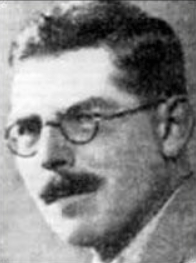Jorian Jenks facts for kids
Quick facts for kids
Jorian Edward Forwood Jenks
|
|
|---|---|
 |
|
| Born | 1889 |
| Died | 20 August 1963 |
| Citizenship | British |
| Education | Harper Adams Agricultural College |
| Alma mater | Balliol College, Oxford |
| Known for | Environmentalism pioneer and fascist |
| Political party | British Union of Fascists |
Jorian Edward Forwood Jenks (1889 – 20 August 1963) was an English farmer. He was a very important person in starting the organic farming movement. He was also involved in a political group called the British Union of Fascists.
Contents
Early Life and Becoming a Writer
Jorian Jenks was born in Oxford. His father, Edward Jenks, was a well-known expert in law. Jorian studied farming at Harper Adams Agricultural College. He also went to Balliol College, Oxford. During this time, he served in the First World War.
In the 1920s, Jenks moved to New Zealand. Later, he came back to England. He worked on his own farm in Angmering, West Sussex. However, he had to stop farming. This was because farm prices dropped a lot. He also had a long-term health problem called asthma. After this, Jenks earned money by writing articles. He wrote for magazines like New English Weekly and Christendom.
Involvement with Politics
Before World War II, Jorian Jenks joined the British Union of Fascists (BUF). This was a political group in Britain. He became their main advisor on farming. He helped raise money for the group by organizing events.
Jenks often wrote about his ideas for the economy. He used the pen name 'Vergillius' for articles in the BUF magazine Action. He was very active in the group's branch in Surrey. He also wrote about how to raise farm animals for another magazine called New Pioneer. In 1936, he was chosen to be a candidate for an election in Horsham and Worthing.
Farming Ideas for Britain
Jenks wanted Britain to produce all its own food. This idea is called agricultural autarky. He suggested that Britain should control what food comes into the country. He also wanted to create a special bank for farmers. This bank would help them manage their debts. He also proposed an Agricultural Corporation. This group would set prices for farm products. This fit with the BUF's idea of a "corporatist" economy.
Jenks also believed that land not used well should be bought by the government. He wanted a "Volunteer Land Army" to help improve this land. Even though his ideas were not fully put into practice, some of them influenced government policy later. For example, after the war, Britain tried to become more self-sufficient in food. Laws were also made that allowed the government to buy land. They also allowed prices to be set for farm goods.
Differences and Detention
Even though Jenks was an important member of the BUF, he sometimes disagreed with its leader, Oswald Mosley. For example, Mosley thought British society was quickly falling apart. Jenks believed it was a slower decline. Jenks also didn't trust modern science as much as Mosley did.
Despite these differences, Jenks was very loyal to Mosley. He even said Mosley was smarter than a famous writer named William Cobbett. Jenks stayed a member of the BUF. In 1940, like many other leaders of the group, he was held by the government. This was under a special rule called Defence Regulation 18B. Mosley had even planned for Jenks to lead the group if he was arrested. But Jenks was also arrested. He was first held for questioning. Then he was moved to Walton Gaol. He was released in 1941. After that, he became a tenant farmer in Seaford, East Sussex.
After the War: Organic Farming and Writing
After World War II, Jenks wanted to connect people more deeply with the earth and soil. In 1945, he joined the Soil Association. This group supported organic farming. He also joined other groups focused on traditional farming and rural life. He strongly believed that the quality of food was linked to the health of a nation. He felt that if food standards dropped, Western civilization would decline.
Jenks became widely known through the Soil Association. He edited their magazine, Mother Earth. He stayed involved with the Soil Association until he died. Another group he was very active in was the Rural Reconstruction Association. He was their press secretary and edited their magazine, Rural Economy. He used this role to promote his idea of Britain producing all its own food.
Jenks wrote several books after the war. These include The Country Year (1946), British Agriculture and International Trade (1948), From the Ground Up: An Outline of the Rural Economy (1950), and The Stuff Man's Made Of: The Positive Approach to Health through Nutrition (1959). His later books focused more on ecology and less on his earlier political views.
Even though the organic farming movement has changed over time, Jenks' ideas are still important. His ideas about sustainable farming, small farms, not relying too much on machines, and preferring local food over international trade are still central to the movement today.
See also
- Ecofascism
- History of organic farming
 | Lonnie Johnson |
 | Granville Woods |
 | Lewis Howard Latimer |
 | James West |

